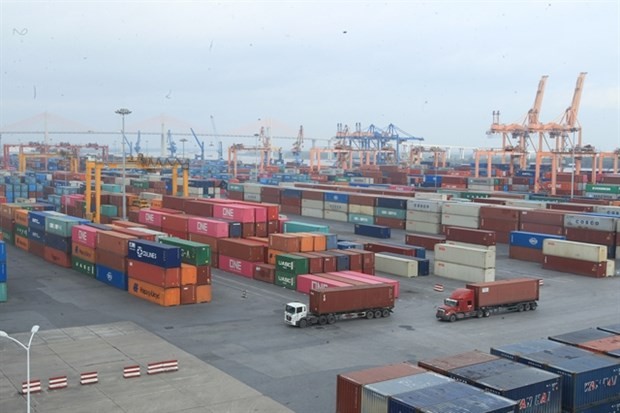
Viet Nam seeks ways to boost logistics industry to its full potential
Latest
 |
| Unloaded goods at Hai Phong city's port. (Photo: VNA) |
The comment was made by Deputy Minister of Trade and Industry Nguyen Sinh Nhat Tan at a seminar on “Enhancing competitiveness for logistics businesses”, held in Ha Noi on April 28.
Delivering a speech at the seminar, Tan said the Government has identified logistics as an important service industry in the economy. The industry is playing a role in supporting, connecting and boosting socio-economic development, contributing to improving the competitiveness of the economy.
At the seminar, Truong Tan Loc, Marketing Director of Saigon Newport Corporation, said that in April this year the World Bank forecasted the country’s GDP growth to be around 5.3 percent in 2022 and then stabilise to around 6.5 percent next year.
Loc said the country’s signed free trade agreements (FTAs) needed to be more proactively implemented for strong growth in domestic industries, especially in electronics, machinery and equipment, furniture, plastic, textiles and seafood. This was an opportunity to develop port and logistics services to serve the needs of connecting goods with major markets in the world.
Sharing the view of Loc, Pham Thi Lan Huong, general director of Vinafco JSC, said Viet Nam’s logistics industry has a lot of potential but it is fragmented. She noted the number of small and medium-sized businesses accounted for a majority, with 90 percent of them having capital of less than 10 billion VND (434,000 USD).
Currently, the number of businesses providing 3PL (third-party logistics) and 4PL services (fourth-party logistics) remains modest. They account for only 16 percent of the entire logistics industry. Huong said it needed to develop more 3PL and 4PL businesses to push the domestic logistics industry.
Another participant suggested that it was necessary to promote technology application in the domestic logistics industry to improve efficiency and optimise productivity, to save costs for logistics businesses. In addition, a close connection between logistics businesses was also a need to improve operational efficiency involving production, logistics and transport.
At the seminar, representatives of the authorities also pointed out the shortcomings in import and export activities in 2021, and logistics activities of Viet Nam.
The Import and Export Report 2021 points out significant problems such as the continued high level of trade deficit or surplus for some markets, which is likely to affect sustainable import and export activities.
The export growth of some commodities is mainly based on the increase in quantity and price due to the scarce supply in the market. Exported goods still face congestion at border gates and seaports, especially from the end of 2021.
In logistics services, although there has been a strong development recorded, the logistics industry still has many limitations. One of them is that logistics enterprises have not yet developed up to the potential of the industry.
According to data from the Vietnam Logistics Business Association, currently, 90 percent of logistics enterprises operating are Vietnamese enterprises. However, they only account for about 30 percent of the market share. The rest belongs to foreign enterprises.
There are many enterprises, but mostly small ones, with limited scale in the capital, human resources and experience.
In the framework of the seminar, the Vietnam Import and Export Report 2021 compiled by the Ministry of Trade and Industry was also announced, highlighting the positive points in international trade activities. Despite many difficulties due to the COVID-19 pandemic, the country's imports and exports still reached a record with a total turnover of 668.55 billion USD. While exports reached more than 336.3 billion USD, up 19 percent compared to 2020; imports reached 332.2 billion USD, up 26.5 percent; trade surplus of more than 4 billion USD.
With this result, Viet Nam has entered the top 20 economies in terms of international trade. The export structure has changed positively, and the area of export products is diversified.
The group of processed products continues to be the driving force for the overall growth of exports. Viet Nam has also made efforts to diversify export and import markets to meet the needs of domestic production and consumption.
Deputy Minister of Industry and Trade Tan passed comments on the results achieved in import and export activities in 202 and international trade activities of Viet Nam.
The total import and export turnover of goods from 2010 up to now has increased 4.25 times, up from 157.1 billion USD in 2010 to 668.5 billion USD in 2021. He said that the positive result was thanks to the contribution of the logistics service.
“During the COVID-19 pandemic, despite many difficulties, Vietnamese logistics enterprises adapted and maintained their supply chains. They have supported other enterprises in finding solutions to optimise logistics activities, saving costs and time.
They propose the state's strategic issues, contributing to maintaining and stabilising the supply chain and improving the competitiveness of Vietnamese goods and businesses. Businesses also make efforts to modernise technology to improve service quality and diversify services to overcome difficulties," said the Deputy Minister.




















